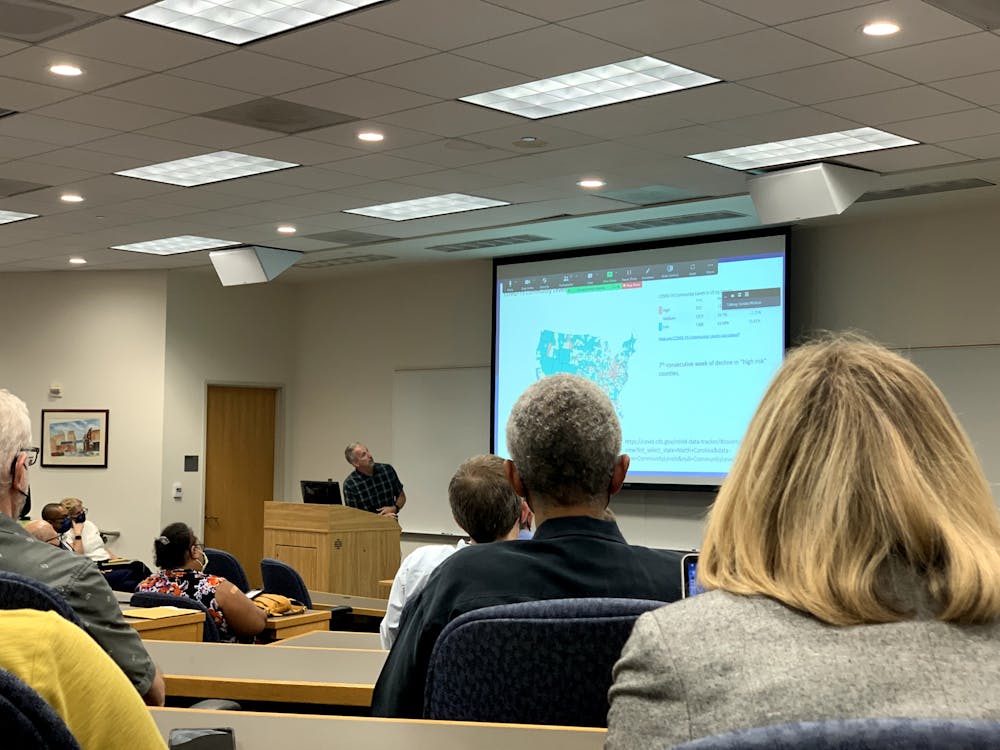Academic Council heard an update about Duke’s COVID-19 protocols in its Thursday meeting, the first of the academic year.
Professor of Biology Steven Haase; Carol Epling, assistant professor in family medicine and community health; and Paul Grantham, assistant vice president for communication services, presented the COVID-19 update to the Council.
According to Haase, national trends have indicated a plateau in the number of cases. Throughout the summer, student and faculty cases also remained at a steady level. There was a boost in the number of cases during the move-in period for undergraduate students and during the two weeks of classes.
Haase said that despite the boost, this was at the “low end of what we were seeing at the end of the semester last spring.”
Now the University is back to a low and steady stream of faculty and student cases, with Haase noting that the majority of cases come from the Omicron BA.4 and BA.5 subvariants.
Duke still plans to remove its mask requirement in classes once Durham stays in the medium risk category for COVID-19 for two consecutive weeks. Durham entered the medium risk category last week, and if it remains that way until the weekly CDC update on Sept. 22, the University’s mask requirement will be removed, Grantham said.
However, even after the classroom mask mandate has been lifted, faculty can establish mask requirements in their individual classes, Grantham said.
“We think it's important to include some flexibility for faculty in the classroom,” he said. “So if you want to require masking … you can do that.”
Elizabeth Albright, assistant professor of the practice of environmental science and policy methods, asked what defined a classroom when determining whether masks need to be worn or not under the current policy.
Grantham said that the current policy’s intent is for masks to be worn when a classroom is being used for instructional purposes.
Campbell Harvey, J. Paul Sticht professor of finance, expressed concern that the COVID-19 data that is being analyzed is less reliable today than last year, when the University mandated surveillance testing for all students. Asymptomatic surveillance testing has been optional for students, faculty and staff since late March.
Duke is offering doses of the new COVID-19 booster, which targets the BA.4 and BA.5 strains of the Omicron variant. “We all need to get this [new] booster so that we can all do our part in reducing the transmission risk of this very slippery virus that depends on transmission to to mutate,” Epling said.
Epling also encouraged members of the University community—including faculty—to get a flu vaccine, even though they are not mandated this year.
Return to campus
After the main presentation, Provost Sally Kornbluth urged faculty to “come back to campus.”
“I understand that working from home can be really convenient,” Kornbluth said. “I just hope that we can start populating the campus for our students.”
Erika Weinthal, professor of environmental policy and public policy and chair of the Academic Council, echoed Kornbluth’s sentiment, claiming that some faculty felt that participation in Council meetings on Zoom leads to decreased levels of engagement during meetings.
“We’re trying to encourage more in-person attendance,” Weinthal said. “As we move to returning to a fully in person, residential campus it’s really critical to the building of our community at Duke.”
Faculty asked to keep remote attendance a regular option for governance meetings at an Arts & Sciences Council meeting on Sept. 8.
In other business
Get The Chronicle straight to your inbox
Sign up for our weekly newsletter. Cancel at any time.
The Executive Committee of the Council is revising the Faculty Handbook, and aims to have a draft ready for the Council’s consideration and approval this spring.
The Council approved new members of the Faculty Hearing Committee. The FHC has jurisdiction to consider procedural issues relating to complaints from faculty regarding issues including academic freedom and tenure, misconduct, discrimination and harassment.
The new members of the FHC are William Mayew, Martin L. Black Jr. distinguished professor of business administration; Joseph Blocher, Lanty L. Smith ’67 professor of law; Geraldine Dawson, William Cleland distinguished professor of psychiatry and behavioral sciences; Adrienne Stiff-Roberts, Jeffrey N. Vinik professor of electrical and computer engineering; and Professor of Pathology Herman Ford Staats.

Adway S. Wadekar is a Trinity junior and former news editor of The Chronicle's 119th volume.

